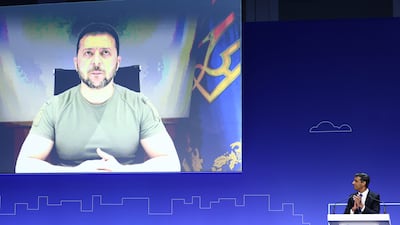British Prime Minister Rishi Sunak said he wanted to plant the seeds of Ukraine's future as major allies gathered at a conference in London to boost confidence in a country fighting off an invasion by Russia.
European Commission President Ursula von der Leyen told attendees that Ukraine would certainly emerge as a full member of the EU, something that should underpin faith in its recovery.
Appearing by video, President Volodymyr Zelenskyy told the Ukraine Recovery Conference his country would be a real asset to the EU economy. “We are only waiting for the courage of the alliance leaders to recognise this reality – politically, [we have been] the largest source of economic, industrial and technological growth in Europe for decades and decades,” he said.
Opening the conference, Mr Sunak said Ukraine held powerful incentives for the world to back its recovery.
“Before this terrible war, Ukraine's economy was becoming a huge investment opportunity,” he said.
“It was the breadbasket of Europe, exporting millions of tonnes of food and grain each month, a top-five exporter of iron ore and steel, a leader in energy – pushing forward renewables, hydrogen and electric vehicles – and a start-up nation which helped spark names like PayPal, WhatsApp and Revolut, with a thriving tech sector which actually had a record year in 2022.
“The truth is, that opportunity is still there today – in fact, the war has only proven how much Ukraine has to offer.”
Mr Zelenskyy wanted tangible announcements on starting specific projects, even as the World Bank estimates that the cost of reconstruction will exceed $400 billion. “We must move from agreements to real projects,” he said. “There is a Ukrainian delegation that will present concrete things and we propose to do them together during my tour.”

The EU offered Ukraine candidate status last year, and Ms von der Leyen spoke of how inspiring that had been for its citizens. “Ukrainians tell us that when they imagine their future, they see Europe's flag flying over their cities,” she said, and added: “I have no doubt that Ukraine will be part of our union.”
The EU announced a 50bn Ukraine financing package ahead of the donor summit and said it hopes to cover 45 per cent of the country's budget shortfall over the coming years.
Antony Blinken, the US Secretary of State, touched on another fundamental issue when he said that Russia would undoubtedly bear the costs of Ukraine's reconstruction. He announced a new package of $1.3 billion in US economic assistance for Ukraine, focused on energy and infrastructure needs.
“As Russia continues to destroy, we are here to help Ukraine rebuild – rebuild lives, rebuild its country, rebuild its future,” he said.
Germany said it would provide 381 million euros in humanitarian assistance this year, Foreign Minister Annalena Baerbock said. Her French counterpart, Catherine Colonna announced 40 million euros.

The UK said it would guarantee $3 billion of World Bank loans to Ukraine over three years to bolster its economic stability in the face of Russian aggression. Britain will also offer £240 million ($306 million) of assistance to Ukraine this year for programs including mine-clearance and disaster relief kits, as well as energy projects. The package brings Britain's overall non-military assistance to Ukraine totals more than £4.7 billion.
Mr Sunak said he was personally struck by Ukraine's technological expertise, with IT experts and the military having developed a mobile app to track the Shahed drones being used by Russia.
“In a converted office block I met tech experts – civilian and military – who were working together to find new ways to bolster the country's defences,” he said. “They were networking mobile phones so that people across Ukraine could download an app which would allow their phone to pick up the sound of the Shahed drones and feed back the location so that Ukrainian air defence could track them and shoot them down.”
He also told the story of a frontline soldier who showed that he cared about the future of the people he was fighting for, and their return.
“He was stationed in an empty house, not far from the front line, surrounded by the destruction of war,” Mr Sunak said. “When he could snatch a moment of free time, he used it to plant seeds. He was trying to create a plot of vegetables, hoping that by the time the homeowners returned, they would have begun to grow. What a profound expression of hope.
“And, you know, from that house to this hall, we’re doing the same thing. We’re planting the seeds of Ukraine’s future. Today, we can water them and in time the Ukrainian people will harvest them.”


